Get Easy Health Digest™ in your inbox and don’t miss a thing when you subscribe today. Plus, get the free bonus report, Mother Nature’s Tips, Tricks and Remedies for Cholesterol, Blood Pressure & Blood Sugar as my way of saying welcome to the community!
5 ‘magic’ seeds to snack on every day
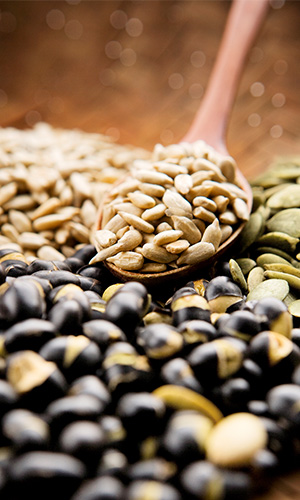
Sometimes the seeds inside fruits and vegetables are harmful. For example, the seeds and pits of apples, apricots, cherries, plums and peaches contain a chemical that breaks down into cyanide, which is poisonous. However, it’s unlikely most of us would eat those, let alone enough to do us harm.
But in other cases, the smallest part of a plant contains the most powerful nutrition…
Here are five seeds in particular that you should know about. Because these tiny powerhouses are so packed with goodness — they could actually help you live longer and healthier!
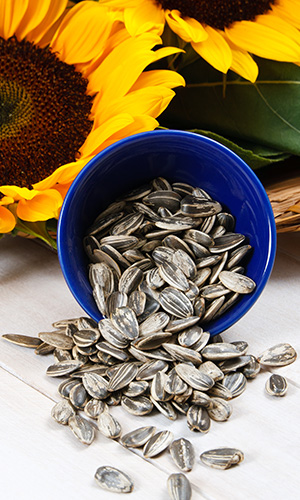
Sunflower seeds
Sunflowers, those beautiful sunbathing flowers, were being cultivated in North America as early as 3000 B.C.! It wasn’t until the 1800s, though, that their oil and seeds became known as nutritional sources.
Just a small serving of sunflower seeds (just a quarter cup) contains huge amounts of vitamin E and copper, as well as Vitamin B1 and manganese. Copper helps make red blood cells and keeps nerves and immune system healthy. And manganese is needed for normal brain development, and the growth of connective tissue.
Moreover, that same quarter cup contains 34 percent of the required daily amount of cancer-crushing selenium. If you are a vegetarian or vegan, you need to make a concerted effort to get enough selenium. That’s because, besides Brazil nuts and mushrooms, the main dietary sources are fish and grass-fed beef.
Combined with Vitamin E, selenium is a potent antioxidant. More importantly, a selenium deficiency can lead to hypothyroidism, an underproduction of thyroid hormone that slows down the entire body.
Read: 7 signs of thyroid problems
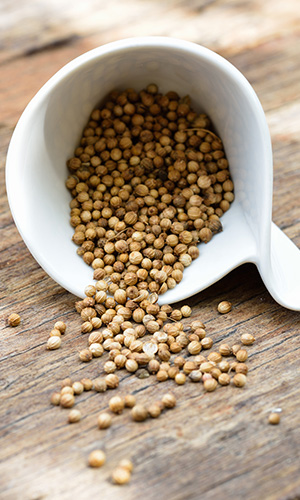
Coriander seeds
Cilantro, the herb used to season salads and other dishes, is actually the leafy part of the coriander plant.
Studies have shown that coriander seeds decrease blood sugar and reduce insulin resistance. And, in animal studies, they have reduced colon cancer risk by protecting against the action of fats in the colon.
But, they are perhaps best known as a digestive aid, and for treating mild insomnia.
Read: 7 kitchen ingredients to improve blood sugar control
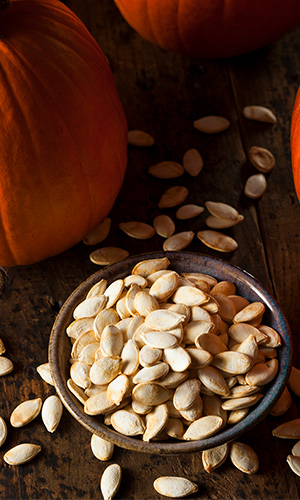
Pumpkin seeds
Pumpkins have been cultivated in North and South America for hundreds of years, and their seeds valued for a wealth of nutritional content.
After all, pumpkin seeds are rich in heart-healthy magnesium and omega-3s, and zinc to support both immune and prostate health.
Two other benefits of pumpkin seeds you should appreciate: they contain the amino acid tryptophan, which your body converts to serotonin and then melatonin, the “sleep hormone.” It’s also reported to soothe IBS symptoms.
And, pumpkin seed oil is rich in natural phytoestrogens. Studies have suggested this may help control hot flashes, headaches and other menopausal symptoms.
Read: 5 diseases magnesium could help you avoid
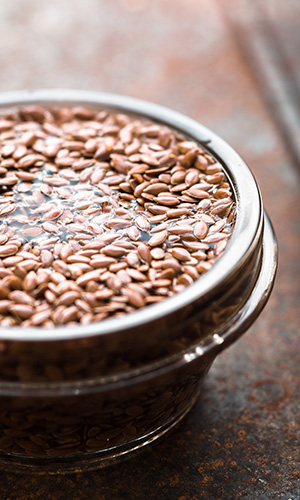
Flax seeds
Flax seeds may be the world’s first cultivated superfood. They’ve been consumed for their health benefits for about 6,000 years, and with good reason: this tiny seed contains:
- Omega 3 fatty acids to fight inflammation and support the heart
- Alpha-linoleic acid (ALA) to promote cardiac function and arterial health
- Essential fatty acids for healthy skin, hair, nails and eyes
- Soluble fiber that lowers cholesterol by trapping fats for excretion
- Flax seeds are rich in lignans, an antioxidant that:
- reduces cellular aging caused by free radical damage
- has antiviral and antibacterial properties
- supports the growth of probiotics in the gut
Read: What this tiny seed does to your big appetite
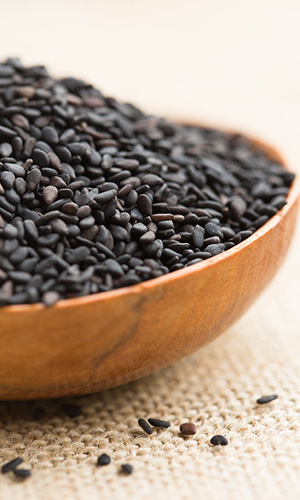
Black sesame seeds
While you may be more familiar with white sesames, Traditional Chinese medicine has long valued the black version for its health properties.
Just a quarter cup of black sesames has 35 percent of the daily requirement of calcium and 32 percent of the RDA for magnesium. Copper, the trace mineral we need to build joint-supporting collagen, is also abundant in black sesames: 74 percent of the daily requirement!
Black sesames are high in phytosterols, plant compounds known to lower blood cholesterol. Studies have also shown that phytosterols can inhibit tumor growth in the lungs, stomach, ovaries and colon.
Read: 4 ways to lower triglycerides without statins
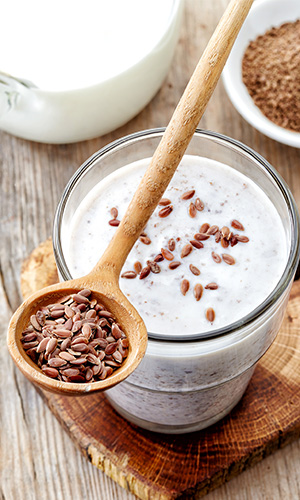
How to add more seeds to your diet
It’s easier than you may think!
- Sprinkle them into your salad for some extra crunch.
- Toss them onto your morning oatmeal or other cereal.
- Add them to your smoothies and yogurt.
- Sesame, pumpkin and flax seeds are especially good for baking into breads and muffins.
- Buy sunflower seed butter and spread on toast.
- Try overnight chia seed breakfast pudding!
- Roasted sunflower or pumpkin seeds, lightly salted, are a delicious snack on their own, or added to granola or trail mix.
- Keep ground coriander seeds in your pepper mill. They add a Middle-Eastern flavor to your meat and fish.
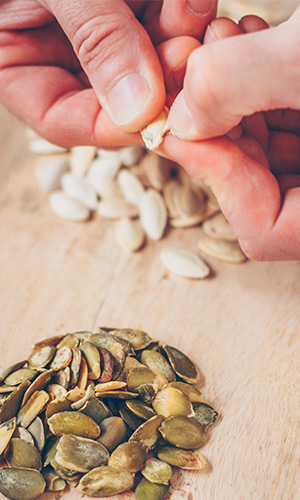
A few precautions
Salted seeds are often sold as a healthy snack food. Just be aware of the sodium content, and don’t overdo it. If you prefer a salty taste, look for seeds seasoned with sea salt. Or better still, roast your own at home.
Beware that pumpkin seeds are very chewy. That means eating a lot of them could cause indigestion or gas. Again, as with most foods, moderation is the key.
For some people, too many coriander seeds can be problematic, causing allergic skin and breathing reactions. If you are prone to these, check with your doctor first.
The healthy fat content in some seeds means they can become rancid. Be sure to store them in air-tight containers for no more than about two months.
You might also enjoy…
6 really weird signs you might have heart disease
Ther are signs that show up in your eyes and mouth, on your fingers and on your earlobes, that can warn you of cardiac problems to come.
It sounds weird but it’s true.
Here are the six signs you should look for… Continue reading…














